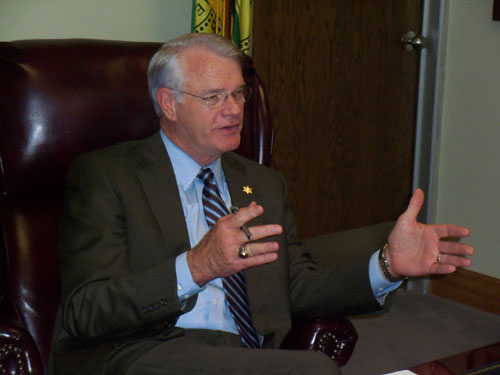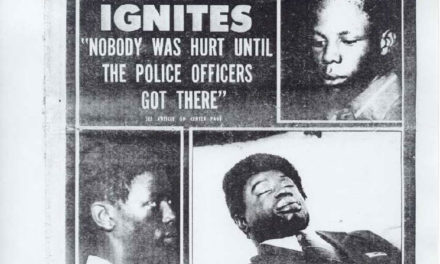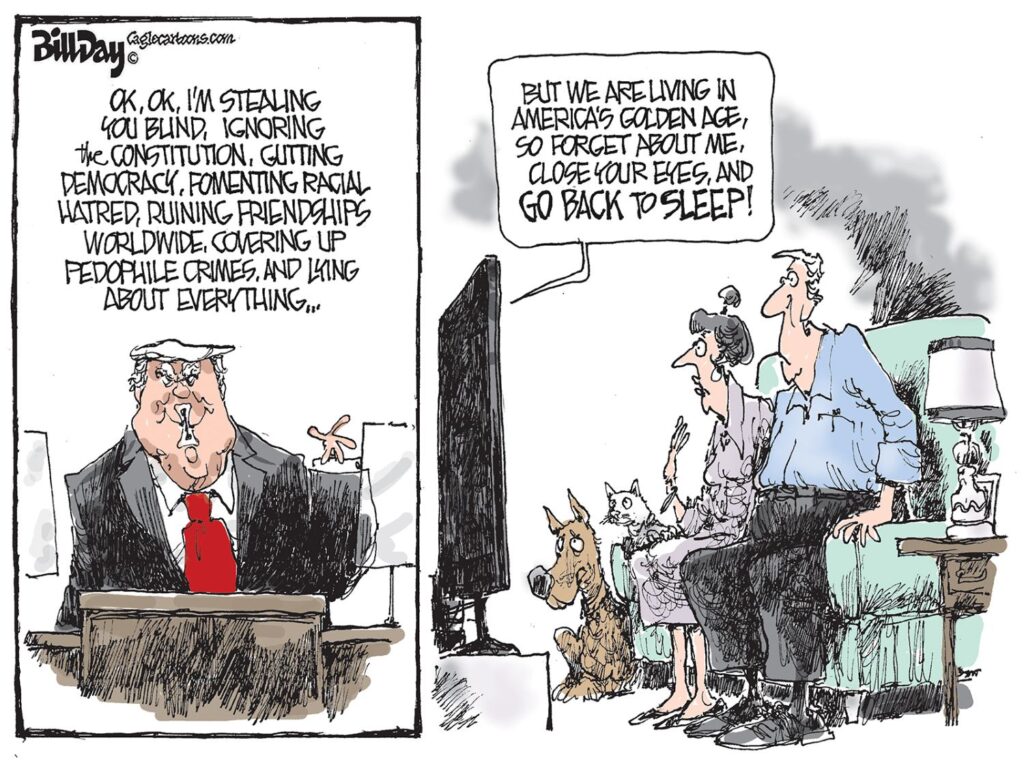It’s déjà vu all over again, but when it comes to the crisis in the Shelby County Jail, there’s no reason to smile over the famous Yogi-ism.
The fact that the human rights calamity in the jail was solved in the early years of this century is reason enough for the frustration in Mark Luttrell’s voice when the subject of Shelby County Jail comes up.
After all, when he was elected Shelby County sheriff in 2002, Mr. Luttrell inherited a class action lawsuit attacking the jail’s conditions punctuated by harsh comments from U.S. District Court Judge Jon P. McCalla who took the drastic action of appointing a special master to oversee jail operations. All of this occurred as the U.S. Department of Justice expressed interest in intervening.
Within five years, the judge hailed Mr. Luttrell’s solutions and the transformation of the jail operations and culture. The new sheriff was uniquely qualified because no sheriff elected in this county before him had a background in corrections. When elected, he was the only sheriff elected in the state’s 95 counties who had a background in prison management.
He had in fact served as warden of several federal prisons which gave him deep knowledge when confronted by Shelby County Jail operations that were out of control as a result of a culture that placed no value on inmates’ constitutional rights. It also operated on the mistaken assumption that there was no difference in qualifications between deputies and correctional officers, Mr. Luttrell said.
Even Prisoners Have Rights
All of this gives him special gravitas when he speaks today about the disaster that is jail operations under Sheriff Floyd Bonner. “If we don’t do something, it will repeat like it was 25 years ago,” said Mr. Lutrell, adding that he has cautioned several sheriffs that the jail would be their greatest liability.
“Inmates have no political power but they have constitutional rights,” he said. He added that if the problems are not corrected at the local level, ultimately, “a federal court will straighten it out.”
Unlike many elected leaders, Mr. Luttrell’s ability throughout his career to be more of a statesman than a politician allows him to have conversations with people across political partisan lines. It’s the willingness to listen and talk with everyone that resulted in an illuminating podcast interview on August 4 with Just City’s Josh Spickler.
Shelby County Jail Culture: A Death Sentence For Too Many: November 10, 2025
In the divisive political context of our times, the willingness for anyone identified with a specific political party to consider any good idea, regardless of the politics or philosophy of the other person, is a breath of fresh air. As Mr. Luttrell explains it, he may not have the same political positions as Mr. Spickler or Shelby County Attorney General Steve Mulroy, but dismissing their opinions out of hand is a failure of democracy.
He said it took six years and cost $25-30 million to improve the culture of the jail when he was sheriff. “The tragedy of all of this is so much time was spent to change the culture” but it has fallen by the wayside, particularly the impact of direct supervision by officers in the jail pods. A new jail is part of the answer but it’s about one-third of the answer. If you want a new jail, great. Go for a new jail but don’t make a new jail the focus of your remedy.” The projected cost of a new jail complex has been said to be as high as $1.4 billion but sheriff’s officials say this is the worst case price.
The Malignant Jail Culture
As the death toll of inmates rises to about one fatality a month (67 since 2019), Sheriff Bonner seems unable to grasp the deadly impact of a malignant culture in the jail and the negative impact on the constitutional rights of inmates. Whether as an attempt at distraction or a sign of incompetence, Mr. Bonner’s focus on a new jail facility sacrifices the immediate need for culture change in favor of a building that is five to 10 years into the future.
Unfortunately, too much of the public – including county elected officials, have been lulled into the same thinking. “I don’t think too many people feel the crisis in criminal justice, and as a result, it’s an issue the public takes lightly,” said Mr. Luttrell.
He is of course right. The human casualty rate should be enough to have the public howling about conditions in the jail and demand smart thinking about how to remedy an intolerable situation Once upon a time, a dedicated sheriff, a thoughtful judge, engaged county commissioners and mayor, and an effective special master created the perfect collaboration and a “level of collegiality” to turn the jail in the early 2000s into a model facility.
Today’s “splintered relationships” are a prime reason for the failure in county government to seek answers to the current jail crisis.
Its current culture indicates how quickly things can decay when sheriffs are unconcerned about the quality of jail operations – and the rights of prisoners. Fortunately, Sheriff Bonner is term limited, and voters now have the opportunity to insist on electing a new sheriff focused on solutions, constitutional rights, mental health, and empathy.
“The tragedy is how quickly it was forgotten,” said Mr. Luttrell, saying the “the foot was taken off the pedal.”
The Three-Legged Stool
During Mr. Luttrell’s two terms as sheriff before being elected mayor, he established new programs that reached out to Memphis neighborhoods and organizations to develop ideas to fight crime, blight, and disinvestment. He maintained these grassroots connections as mayor, he said public involvement is needed to attack the most difficult problems facing our community, especially those that are structural such as concentrated poverty, toxic stress in the lives of our youngest children, and uniting to combat crime in our neighborhoods.
We also remember Mayor Luttrell for challenging conventional wisdom as he did when he called for a more comprehensive agenda for reducing crime. In a November, 2009, City Journal article in Memphis magazine, I wrote:
“It’s a familiar day for Shelby County Sheriff Mark Luttrell. In the early morning hours of a sunny weekday, the county’s leading Republican is the only Caucasian in a church meeting with an African-American congregation. Across racial and political divides, which so regularly choke off real discussion here, everyone is in complete agreement.
“The sheriff speaks with passion, calling for crime-fighting in Memphis to be more than the familiar ‘lock them up’ strategies that parade 60,000 people through Shelby County Jail each year. He’s talking about the ‘other two legs of the stool’ for fighting crime — prevention and intervention — and calls the ‘third leg of the stool,’ suppression, the easiest to do. Many in the audience appear surprised to hear someone from the Republican side of the political scene delivering a message that often gets short shrift even from Democrats.”
Perhaps, in the past seven and half years, Mayor Luttrell has made it too easy for us to overlook and underappreciate the steadying hand he brought to county government during an earth-shaking recession that torpedoed the budgets of local government and the calming influence he played on numerous issues.
His special concern lies with 575 people in Shelby County Jail — the 500 with mental-health issues and the 75 who are juveniles. The size of both groups is growing because as usual, the buck stops with local government. As state government slashes budgets, reducing space in juvenile facilities and reducing beds in mental institutions, the cost falls to taxpayers in Shelby County because more people end up in jail. “It just isn’t right to have the mentally ill in jail,” he said. “If the state was upholding its end of the bargain, we wouldn’t have this problem.”
**
These commentaries are also posted on the Smart City Memphis Facebook page and on Instagram along with occasional articles, reports, and commentaries that are relevant to Memphis.






